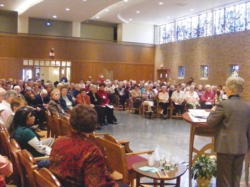Symposium explores problem of human trafficking
More than 230 educators, social workers and law enforcement professionals attended a symposium, “Human Trafficking: What Can One Person Do,” hosted by the Sisters of St. Joseph Nov. 1 at the order’s Brighton motherhouse.
“It seems that once people start to realize the depth and reach of this problem both locally and world-wide, there’s no turning back,” said Sister Joanne Gallagher, CSJ, who helped organize the event.
“Every seat was filled. The number of participants is a witness to the fact that this is an issue of deep concern to many who are concerned about the dignity of life,” Sister Joanne said. This event was a follow-up with a similar program the order hosted in April.
During the event, held inside the motherhouse’s Holy Family Chapel, there was a deepening awareness and networking among the attendees, she said. “It was also evident that this is only the beginning.”
The Sisters of St. Joseph were joined in sponsoring the symposium by the Boston unit of the Leadership Conference Anti-Trafficking Coalition, which includes members of local religious congregations and other interested individuals, she said.
The purpose of the symposium was to create an opportunity to identify and explore practical aspects of human trafficking, recognize those who may be trafficked, consider actions to take if you meet someone who is trafficked, learn about resources in the greater Boston area and hear about possibilities for personal involvement, she said.
“All came with a desire to connect with others and learn how to address the complexities of modern-day slavery/human trafficking -- a horrific yet hidden crime that is becoming one of the most lucrative businesses in the world,” she said.
“An estimated 850,000 people are trafficked annually worldwide, according to the State Department, 20,000 of them into the United States,” she said
“Human trafficking forces men, women, and children into pornography, prostitution and other sexual exploitation, as well as labor exploitation,” she said.
It is important for religious women to get involved, said Sister Catherine Ferguson, SNJM, an non-governmental organization representative for 16 religious congregations at the United Nations.
“We address this issue because we are human beings, because we are women, because we are women religious with a history of Catholic social teaching, and because we live in the United States, a country of destination for the trafficking trade,” Sister Catherine said.
Another speaker, Boston police Det. Sgt. Kelley O’Connell from the Boston Area Human Trafficking Task Force said there are sobering statistics on the local situation that point to the urgent need in the Boston area for safe houses for women who are trafficked.
Cynthia Kennedy of Project REACH presented a talk on how to recognize the signs that someone is a victim of trafficking, Sister Joanne said.
Sister Betsy Goodwin, OSF, in the closing presentation, said it was important for participants to work together and reach out to stretch and mend the hearts of all of the various victims affected by the crime of human trafficking.
“After the passage of the U.S. Trafficking Victims Protection Act of 2000, in 2003 the United States Conference of Catholic Bishops began educating segments of the public about the horrors of human trafficking,” Sister Joanne said.
“The bishops began these efforts with members of religious congregations because they realized the sisters’ potential to educate and influence others on behalf of victims of human trafficking,” she said.
“This symposium was witness to the U.S. bishops’ confidence in the ability of religious women to raise awareness and inspire a wide range of concerned and faithful citizens to take action,” she said.
Participants learned that trafficking is a form of modern-day slavery which violates basic human dignity. As presenters shared stories documenting local incidents of human trafficking participants became aware that this hidden crime happens in our own neighborhoods. The wealth of information and resources raised awareness of the groundswell of non-profit faith-based organizations as well as legal and law-enforcement professionals working to eliminate human trafficking.
Often the hidden and complex nature of this crime leaves would-be advocates feeling helpless. This day offered hope that one person can make a difference.



















